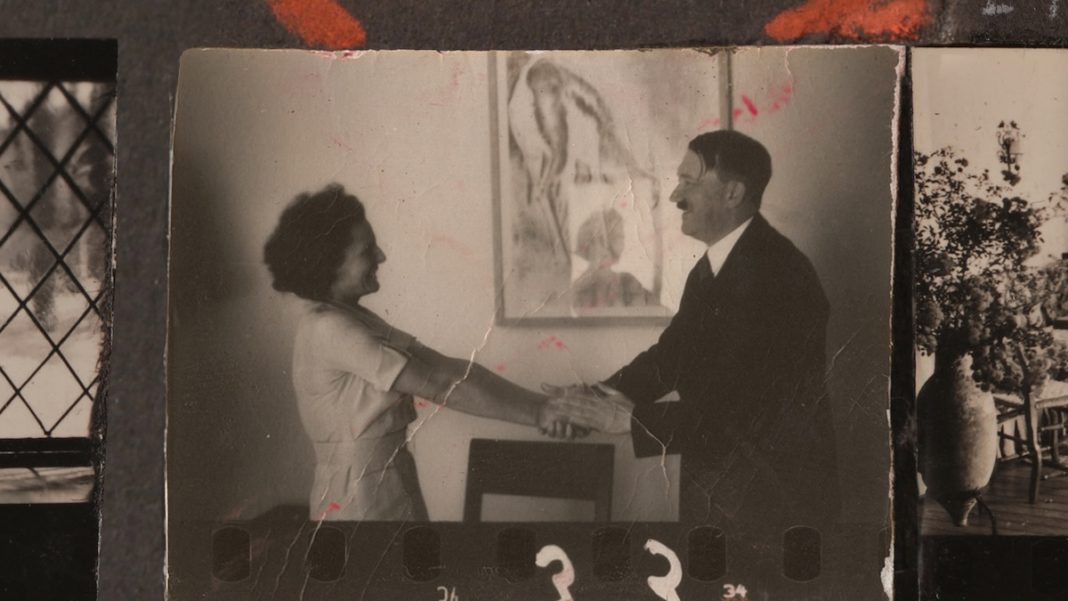Riefenstahl
On August 21, the American Supreme Leader created yet another dubious government agency. The “National Design Studio” is named with this administration’s mastery of doublespeak. One imagines this studio as a facility modeled after the one in Noah Hawley’s TV series Legion, where autocad and photoshop are repurposed for mind-control experiments and all of the meanings implied by “branding”. Because only billionaires matter in the 21st century, Joe Gebbia (Airbnb) was appointed to head the agency as the “Chief Design Officer.” Photos of his smug, benign smile are just as terrifying as RFK Jr.’s official snarl.
By accepting the position, Gebbia’s complicity is a given — whatever damage this Design Studio manages to unleash. But, should we ever return to a less punitive era, will he be considered as culpable as the man, and the Legion of Super-Villains, who appointed him? In Andres Veiel’s documentary Riefenstahl, the director and the audience have the answer to that question from the start. With vast archival resources at his disposal, Veiel has constructed an eviscerating cinematic response to Leni Riefenstahl’s life and career as well as Ray Müller’s 1993 documentary The Wonderful Horrible Life of Leni Riefenstahl.
There is no background narrator summing up Riefenstahl’s collaboration with Adolf Hitler and the broader Nazi party on Triumph of the Will and Olympia, the films that established her reputation as the preeminent documentarian of the era. Veiel, instead, ingeniously repurposes Riefenstahl’s own work, and her own voice, to present a litany of damning evidence. Filmed ten years before Riefenstahl’s death at the age of 101, Veiel inserts an interview that was cut from Müller’s doc. In it, Riefenstahl exhibits the kind of rage that matches Hitler’s oratorical flourishes as she reaches a fever pitch of unflinching ferocity.
Müller had the audacity to ask what interlocutors had been asking of her for decades. He was looking for a glimmer of contrition since an apology, from Riefenstahl’s point of view, was hors de combat. Veiel skillfully arranges video excerpts from British, German and American television talk shows. Whether in black and white or in bleached-out 1970s sepia tones, Riefenstahl returns again and again with the same set of scripted denials, the same unconvincing mask that reveals rather than hides her spiritual decay. With each passing decade, she remains the injured party, wrongly held to account for gas chambers she didn’t build and guns she never fired.
But the former actress kept returning to the stage. Although Riefenstahl appeared to enjoy tangling with the attention from interviews, both the negative and the positive responses from viewers, Veiel also unearths audio recordings of her conversations with Albert Speer, the Nazi Minister of Armaments and War Production. After his release from prison in 1966, they engaged in a correspondence. As baleful players on a post-Nazi world stage, they advised each other on how to profit from their besmirched reputations. To feed a news-hungry public, the media paid both shadowy figures handsomely. The steely-eyed Riefenstahl gleefully took the money, retreated to a lovely forest chalet, and answered her detractors with an insolent, downturned rictus.
Riefenstahl cleanly avoids a sexist approach while recounting her life. The documentary does include Riefenstahl’s accounts of a paternal beating and at least two mentions of rape. But anecdotes about her formative years are included to fill in her portrait not to arouse sympathy from the viewer. For Veiel, she is first and foremost a Nazi propagandist, spiritually and psychically paired with her racist cohorts for eternity.
In 1993, Müller was revisiting Riefenstahl during the production of her final film Underwater Impressions (2002). Her stance of “plausible deniability” infuses his three-hour film with noxious fumes but Müller expects his audience to come to its own conclusions. When Veiel marries an audio account of German soldiers murdering prisoners with a close up of Riefenstahl as an eyewitness, it conveys the truest emotion that ever registers across her celluloid face.
Riefenstahl opens at the Smith Rafael Film Center on Friday, September 19.








